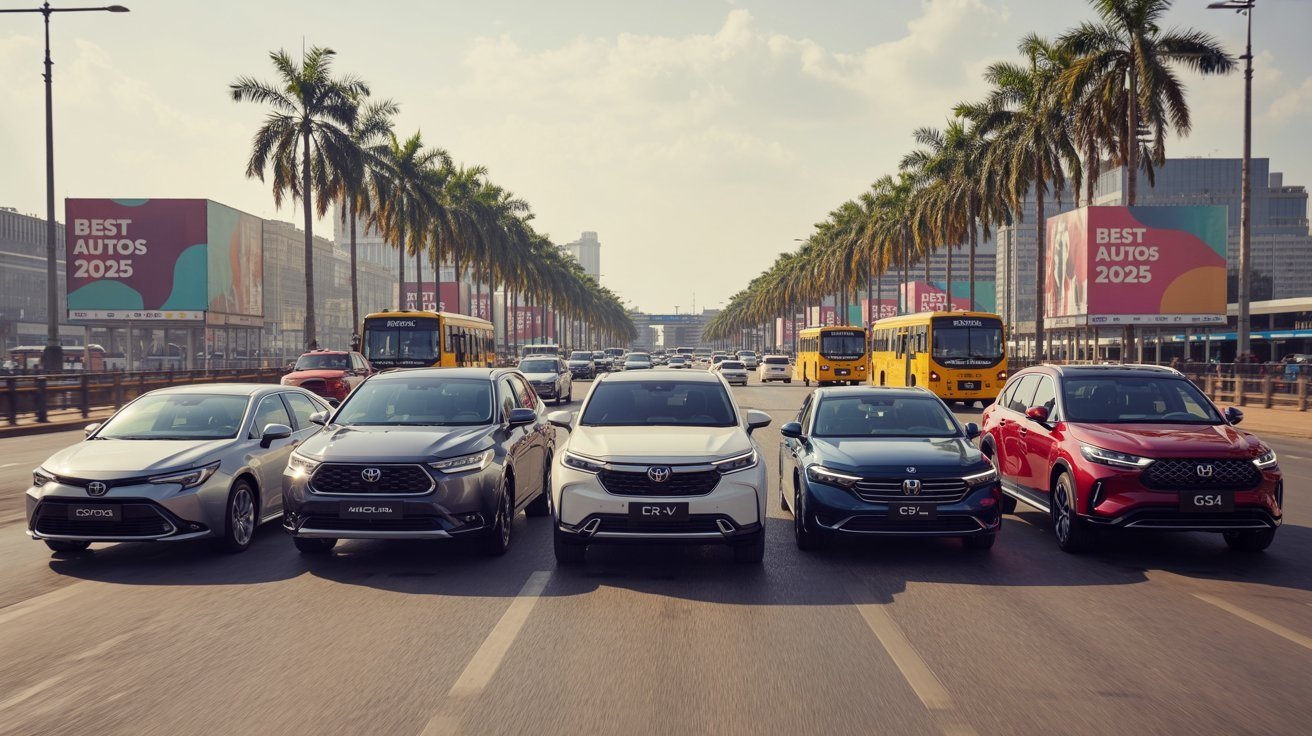Buying a car in Nigeria in 2025 feels like navigating a whole new playing field! Between rising exchange rates, changing import duties, and the flood of newer models including hybrids and electric cars, prices are shifting almost every quarter.
For most Nigerians, cars are not just about luxury; they are about surviving bad roads, managing fuel costs, and finding something affordable without getting scammed.
Industry reports show that over 70% of buyers still prefer Nigerian-used or tokunbo cars, but the appetite for affordable brand-new models especially SUVs and compact sedans is growing fast. On top of that, conversations around hybrids and EVs are entering the mainstream, even if adoption is still slow.
In this guide, you will get a complete breakdown of the best cars to buy in Nigeria in 2025:
- Latest car prices (SUVs, sedans, hatchbacks, hybrids & electric options)
- Affordable picks for budget-conscious buyers
- Models that handle Nigerian roads and fuel realities
- Special mentions like luxury brands and popular city cars
Whether you are a first-time buyer or simply upgrading, this guide will help you compare options, avoid costly mistakes, and choose a car that truly fits your budget, lifestyle, and long-term plans.
- Overview of Nigeria’s Car Market in 2025
- Price Guide for Cars in Nigeria 2025
- Best Affordable Cars in Nigeria 2025
- Best SUVs for Nigerian Roads 2025
- Best Pickup Trucks in Nigeria 2025
- Best Crossovers in Nigeria 2025
- Best Hatchbacks in Nigeria 2025
- Best Mid-Range & Luxury Cars in 2025
- Other Popular (But Less Mainstream) Cars in Nigeria 2025
- SUVs vs Sedans vs Hatchbacks vs Crossovers vs Pickups – Which Should You Choose?
- Car Financing Options in Nigeria 2025
- Car Ownership Costs in Nigeria 2025
- Car Resale Value & Depreciation in Nigeria 2025
- Chinese & Locally Manufactured Cars in Nigeria 2025
- Hybrid & Electric Cars in Nigeria 2025
- Tips for Buying a Car in Nigeria in 2025
- Common Challenges & Mistakes to Avoid in Car Financing & Ownership
- Conclusion
Overview of Nigeria’s Car Market in 2025
The automobile market in Nigeria in 2025 is showing both challenges and glimmers of change. After years of heavy reliance on used imports (Tokunbo), high duties, currency fluctuations, and demand uncertainties, some shifting patterns are emerging.
Understanding these trends will help first-time buyers, dealers, and industry watchers know what’s moving and what to expect.
Trends in the Nigerian Auto Industry (Imports, Local Assembly, Electric/Hybrids)
- Used car imports continue to dominate the market. Most Nigerians still opt for Tokunbo vehicles because of the steep price of brand-new cars, driven up by import duties and foreign exchange rates.
- There is a growing government pressure and regulation to encourage local assembly and manufacturing. The National Automotive Design & Development Council (NADDC) and other policies push for greater local content, to reduce costs and to stimulate jobs.
- Electric Vehicles (EVs) & Hybrids are still small segments, but they are gaining traction. Nigeria’s 2025 EV import rules reduced duties, offered some exemptions (e.g. VAT / Import Adjustment Tax) to encourage EV purchases, especially for newer models (post-2015 manufacture).
- Chinese brands are making inroads. Brands like GAC, MG, Changan are increasing presence in the market, often offering good value, warranty, and competitive pricing. Their growth reflects shifting preferences among people who want new, feature-rich cars without the huge premiums of some established brands.
Popular Car Types: SUVs, Sedans, Hatchbacks, Crossovers, Pickups
- SUVs and crossovers remain among the most popular body types. Nigerians love them for road height, ground clearance, and versatility especially with rough or varied road conditions. Compact SUVs especially are in demand.
- Sedans and hatchbacks still have loyalty, especially for city driving. Corolla-class sedans, Civic, smaller hatchbacks are preferred for fuel economy, lower maintenance costs, and easier maneuvering in urban traffic.
- Pickups and utility vehicles are less common in private use but are strong in commercial and agricultural sectors. These often see use outside cities where ruggedness matters more.
Price Trends in 2025 vs. 2024
- A major trend is price inflation: cars (used and new alike) have become more expensive. Part of this is because of naira depreciation, rising shipping/clearing costs, and higher import duties. Tokunbo prices that were once “affordable” have jumped significantly.
- Even with new policies to lower duties on EVs and reduce costs for hybrid imports, many buyers are still waiting, because total landed cost + tax + clearing + registration still pushes new car prices well above what many in the middle class can easily afford.
- Chinese-brand new vehicles are competing more aggressively now. In some cases, new Chinese SUVs undercut equivalent models from more established brands (Toyota, Honda) on price, features, and warranty. That’s shifting perceptions— “why buy Tokunbo when you can almost afford new Chinese SUV with warranty?” is becoming a real question among Nigerian consumers.
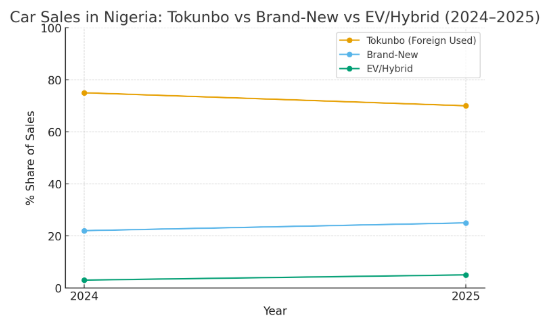
Price Guide for Cars in Nigeria 2025
If there is one thing every Nigerian car buyer wants to know before anything else, it’s “how much is the car?”.
Prices are changing so fast these days that what you saw in 2024 might already be outdated in 2025. Between forex rates, import duties, and dealers adding their margin, it feels like a small lottery.
But let me break it down in a way that makes sense.
Latest prices for popular brands
When it comes to popular brands in Nigeria, here is what you will likely see in 2025 (average estimates across Lagos and Abuja):
- Toyota Corolla (Tokunbo 2014–2016): ₦8m – ₦11m | Brand New 2023+: ₦25m+
- Toyota Camry (Tokunbo 2013–2017): ₦9m – ₦14m | Brand New 2023+: ₦30m+
- Honda Accord (Tokunbo 2013–2016): ₦8.5m – ₦12m | Brand New: ₦26m+
- GAC GS4 (Brand New Nigerian market): ₦15m – ₦20m (depending on trim)
- Hyundai Sonata (Tokunbo 2015–2017): ₦7m – ₦10m | Brand New: ₦22m+
- Kia Rio (Tokunbo 2016–2018): ₦6m – ₦9m | Brand New: ₦20m+
Brand new vs Nigerian used vs foreign used
Now let’s talk brand new vs. Nigerian used vs. foreign used (tokunbo).
- Brand New: You will get the latest tech, safety features, and warranty. Downside: prices are brutal, and depreciation in the first 2 years is heavy.
- Tokunbo (foreign used): Sweet spot for most Nigerians. Cleaner than locally used, often comes with less mileage, and easier to trust than a car that has survived Lagos potholes for 7 years.
- Nigerian Used: Cheapest option upfront, but you need to be sharp. Always go with a trusted mechanic for inspection; Sometimes, the seller just wants to dump problems on you (the new owner).
Cost of ownership (maintenance, fuel, spare parts)
Now, here is where most first-time buyers make a mistake: they forget cost of ownership. Buying a ₦9m Camry is one thing; maintaining it for 3 years is another. Let’s be real:
- Toyota & Lexus: Best for cheap parts and mechanics in every street corner.
- Honda: Reliable but slightly higher parts cost.
- Hyundai & Kia: Affordable to buy, but sometimes parts are scarce and might need ordering.
- GAC: Still new in Nigeria, but Coscharis and CIG Motors are pushing their availability. Parts aren’t as cheap as Toyota’s yet.
And don’t forget fuel consumption. A Corolla or Rio will save you fuel money if you are doing daily commutes. A Camry or Accord will sip more, while SUVs like Highlander or GS4 will really gulp in Lagos traffic.
From my own experience, I once rushed into buying a Nigerian-used Sonata because it was way cheaper than a tokunbo. The first month was bliss.
By the third month, AC failed, suspension groaned, and suddenly I was spending half a million just to get it back in shape. Lesson learned: sometimes, paying a bit more upfront saves you stress (and cash) long-term.
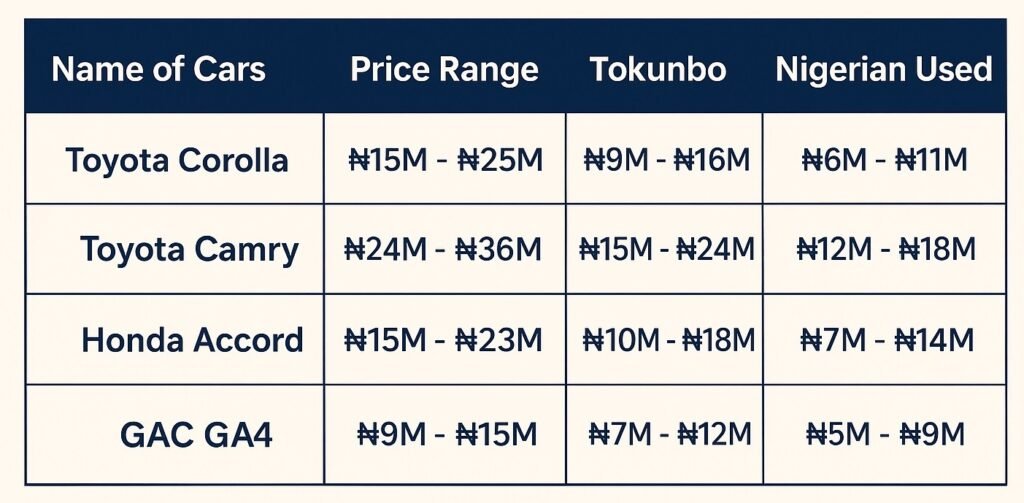
Best Affordable Cars in Nigeria 2025
Let’s be honest, when most Nigerians talk about buying a car in 2025, the very first question is “How much?” I’ve been in that situation myself, running through options, balancing what I want versus what my budget can actually carry.
Affordable cars are where 80% of buyers sit, and thankfully, there are solid choices under ₦10m if you know where to look.
Entry-level sedans under ₦10m
For entry-level sedans, the Toyota Corolla and Honda Civic still dominate. They are not flashy but ask any mechanic in Lagos or Kano, they will tell you these two won’t stress you with parts. A clean tokunbo Corolla (2014–2017 models) goes for around ₦6m–₦9m, and it will serve you faithfully.
Personally, I once helped a family friend hunt for a Civic, and we found one that had clocked over 150,000 km but was still running smoother than a “younger” car from another brand.
Reliable compacts for city driving
Compact cars for city driving? The Toyota Yaris, Kia Rio, and Hyundai Accent are lifesavers. I drove a Yaris once through Victoria Island traffic, and I remember thinking, “Wow, I didn’t even burn half the fuel my Camry would have eaten here.” These cars are tight for inter-state trips, but in Abuja or Lagos city life, they shine.
GAC is also stepping into this affordable space with models like the GA4 sedan, which brand new sits around ₦9m–₦10m. The selling point is the modern interior and warranty, you get that “new car smell” without Lexus-level prices.
Best “Tokunbo” options
Now let’s not forget tokunbo cars which are still Nigeria’s most popular market. The sweet spot for affordability is Toyota Corolla 2010–2015, Honda Civic 2012–2016, and Hyundai Elantra 2013–2017. These fall within ₦3.5m–₦8m, depending on mileage and condition.
Just make sure you bring along a trusted mechanic to inspect, because one tiny oversight (like transmission slipping) can turn an “affordable deal” into an expensive nightmare. I’ve seen it happen.

Best SUVs for Nigerian Roads 2025
SUVs and Nigeria are like bread and akara, you just can’t separate them. With our potholes, rough rural roads, and sudden floods during rainy season, an SUV feels less like luxury and more like survival gear.
I remember once driving a sedan from Benin to Warri during the rains… never again. After bottoming out in a muddy patch, I understood why Nigerians love SUVs so much.
SUVs built for rough roads
For SUVs built for rough roads, the Toyota Hilux (technically a pickup, but doubles as an SUV family hauler), Toyota Land Cruiser Prado, and the Toyota RAV4 are king.
The suspension eats potholes for breakfast, and mechanics practically know them inside out.
Affordable SUVs under ₦15m
When we talk affordable SUVs under ₦15m, a few names stand out:
- Toyota RAV4 (2012–2017 tokunbo) – ₦7m–₦13m
- Honda CR-V (2013–2017 tokunbo) – ₦6.5m–₦12m
- GAC GS4 (brand new 2025 model) – starting ₦14m brand new
- Hyundai Tucson / Kia Sportage – ₦8m–₦13m
The GAC GS4 especially is getting attention in Lagos because you can get a brand new SUV, warranty included, for almost the same money as a tokunbo RAV4. That’s shaking things up.
Mid-range SUVs (₦15m–₦30m)
If you are looking at mid-range SUVs, then Toyota Highlander and Honda Pilot are the family favorites. I’ve taken a Highlander on a road trip from Lagos to Enugu, and the comfort on long stretches of highway was impressive…soft suspension, roomy seats, and strong AC that actually fought off that crazy Niger sun.
Luxury SUVs (₦40m and Above)
Now, for those with deeper pockets, luxury SUVs are a different ball game. Lexus RX350 is almost a cultural symbol here—smooth, stylish, and reliable.
Mercedes GLE and Range Rover Sport are also heavy hitters, but I’ve seen too many people struggle with maintenance costs on a Range Rover. If you can afford it comfortably, fine. If not, stick with Lexus; it’s the sweet spot between luxury and peace of mind.
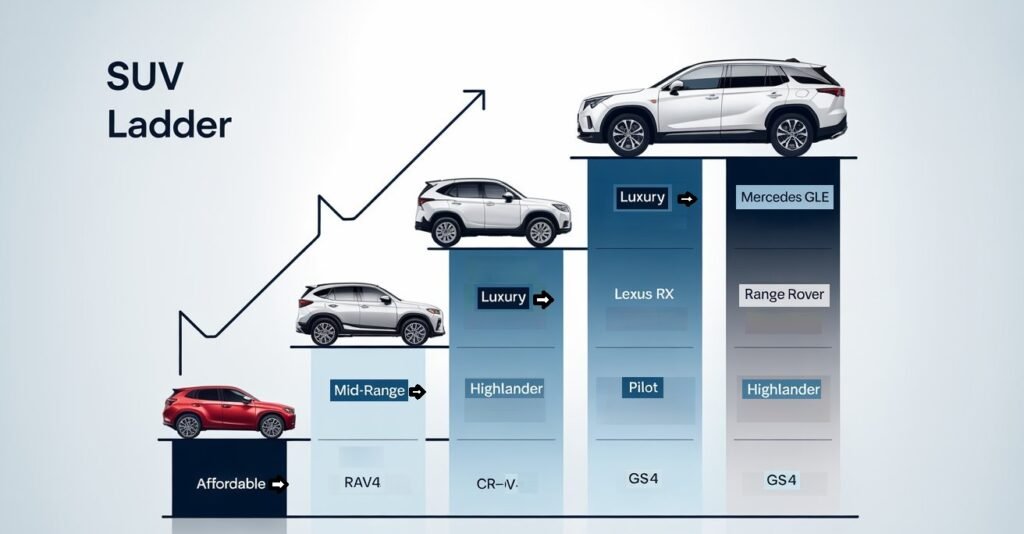
Best Pickup Trucks in Nigeria 2025
I’ve always said if you have never driven a pickup through a muddy Nigerian road in the middle of rainy season, you probably don’t understand why people swear by them.
My first encounter with a Hilux wasn’t even mine, it was a friend’s work truck we took to a site visit in Benin. That machine just kept going, even when smaller cars were stuck spinning in the mud. Since then, I’ve come to see pickups as more than just workhorses; they are a lifeline for businesses, farmers, and even families who like the rugged lifestyle.
In 2025, the Nigerian pickup market still has its heavyweights. Toyota Hilux leads the pack, no surprises there. It’s pricey, usually between ₦25m and ₦40m brand new, but the resale value is excellent, and mechanics know them inside out.
I’ve met contractors who told me they never bother test driving anything else; they just ask for the Hilux keys.
Affordable Workhorse Pickups
For drivers and businesses that need a reliable truck without breaking the bank, there are budget-friendly options under ₦15m–₦20m. These pickups may not have luxury features, but they are rugged and efficient for farm use, logistics, or site work.
Examples include Toyota Hilux (base trims), Mitsubishi L200, and Nissan NP300 (Frontier). They are tough on Nigerian roads, handle rough terrain, and are relatively cheap to maintain since parts are widely available.
Lately, Chinese brands like GAC and JAC pickups are pushing into the market with cheaper options under ₦20m. I’ve seen a few farmers in Ogun using them, saying the lower price makes up for the brand recognition they lack.
Mid-Size Pickups for Work and Family
Nigerians often buy pickups that serve dual purposes — business during the week, family rides on weekends. Mid-range models like the Toyota Hilux Highline, Ford Ranger XLT, and Isuzu D-Max strike this balance.
They offer stronger engines, better comfort inside the cabin, and good resale value. Their popularity among contractors and SMEs keeps demand high. Expect prices between ₦25m–₦35m depending on trim and whether you are buying new or tokunbo.
Ford Ranger is another one making waves. I once rented one for a two-week trip between Abuja and Jos, and honestly, the comfort surprised me. It didn’t feel like a stiff work truck at all. But servicing costs can be higher, and not every mechanic is Ranger-friendly.
Luxury Pickups for Executives & Business Owners
For those who want power, prestige, and comfort, luxury pickups are now a growing trend in Nigeria. Models like the Toyota Hilux Adventure, Ford Ranger Wildtrak, and the Toyota Tundra offer advanced features like leather interiors, bigger infotainment systems, enhanced suspension, and safety technology.
Prices start from ₦45m–₦65m for new 2025 editions, making them a status symbol for top executives, real estate developers, and politicians who need both toughness and luxury.
Here is my advice:
- If resale value and nationwide parts availability matter most, Hilux is king.
- If you want modern features and comfort, test the Ford Ranger.
- If budget is tighter, look into JAC pickups—they may surprise you.
- If you desire class and prestige, Toyota Hilux Adventure, Ford Ranger Wildtrak, and the Toyota Tundra offers that and even more.
One mistake I made once was helping someone buy a cheap used pickup without checking the suspension. Nigerian roads eat suspensions for breakfast. So, if you are buying tokunbo, always check shocks, underbody rust, and gearbox strength.
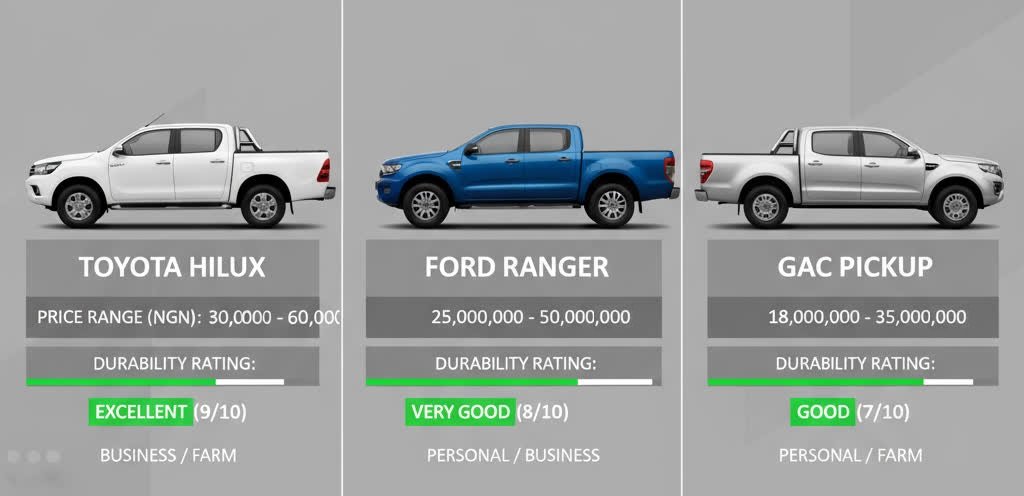
Best Crossovers in Nigeria 2025
Crossovers are like that friend who balances fun and responsibility. You know the one who can party on Friday night but still make it to church early Sunday morning. That’s how I describe them. They sit between sedans and SUVs, giving you more height and space without burning as much fuel as a full-size SUV.
The first crossover I really noticed in Lagos was the Toyota RAV4, and let me tell you, that car is everywhere for a reason. It’s reliable, has decent ground clearance, and doesn’t gulp fuel like a V8 Prado. A 2020–2022 tokunbo RAV4 in 2025 goes for around ₦18m–₦25m depending on condition, and people still rush them.
Another strong player is the Honda CR-V. I had a family friend who upgraded from a Civic to a CR-V, and she kept saying it was like driving on clouds compared to her sedan. It’s comfy, spacious, and parts are easy to find in major cities. But be warned: the resale value isn’t as hot as Toyota’s.
For something fresher, the GAC GS4 and Hyundai Tucson are good value buys. I test drove a GS4 once at a dealership in Abuja, and the tech features honestly shocked me: big screen infotainment, sleek interior, all under ₦15m brand new. The issue, though, is long-term resale. Nigerians still trust Toyota more when it’s time to cash out.
Crossovers are perfect if you do a mix of city driving and occasional long trips. They are also family-friendly with good boot space, safer than sedans, and less intimidating than a full Prado.
Tips from my own mistake? Don’t ignore ground clearance. I once thought my friend’s low-trim CR-V could handle the same bad road my cousin’s RAV4 handled easily. Spoiler: it couldn’t. Always check the trim level and clearance before buying tokunbo.
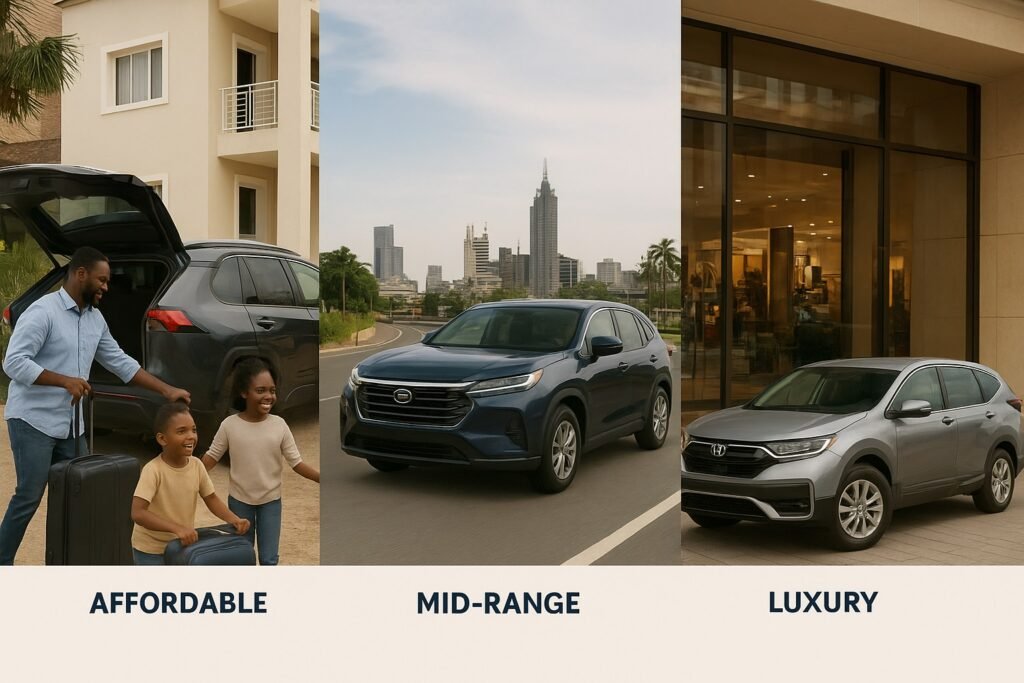
Best Hatchbacks in Nigeria 2025
You know, hatchbacks don’t always get the love they deserve in Nigeria. Most people rush for sedans or SUVs, but if you have ever tried squeezing into a tiny parking space in Lagos Island or fought through traffic in Port Harcourt, you will understand why these small but mighty cars are gems.
My first real encounter with a hatchback was a friend’s Toyota Yaris; it looked small from the outside, but the boot swallowed more groceries than my old Corolla ever did. That was the day I stopped underestimating them.
In 2025, hatchbacks are slowly gaining more respect in Nigeria, especially for younger drivers and small families. The Toyota Yaris and Honda Fit (a.k.a. Jazz in some places) lead the pack. Yaris is known for its reliability and fuel economy, while the Fit is shockingly spacious inside; Honda’s “magic seats” really live up to the name.
Then there’s the Hyundai i10/i20 and Kia Rio hatchback. I once helped a cousin buy a used Kia Rio hatch, and she was thrilled because it gave her sedan-like comfort but was way easier to park near her office in Abuja. Parts were fairly easy to find too, though not as cheap as Toyota’s.
A newer player in this space is GAC GA3 hatchback (though it’s not as widespread yet). Brand new models cost less than ₦12m, making them affordable for first-time buyers who want a modern ride with a stylish edge. I sat inside one at a car expo in Lagos, and the interior tech was more than what I had expected at that price.
If I’m being honest, hatchbacks still face the “Nigerian mindset problem.” A lot of people see them as “student cars” or too small for families. But that’s not really fair. With fuel prices skyrocketing, these cars save a ton on running costs. Plus, tokunbo hatchbacks can be picked up between ₦3.5m and ₦8m depending on the model year. For a clean, reliable city ride, that’s a steal.
Lessons learned from my own mistakes? Always check the rear suspension on used hatchbacks. Because of Nigeria’s rough roads, the back tends to wear out faster, especially if the car was carrying heavy loads. I once ignored this during an inspection and ended up helping a friend spend ₦250k extra fixing it after purchase.
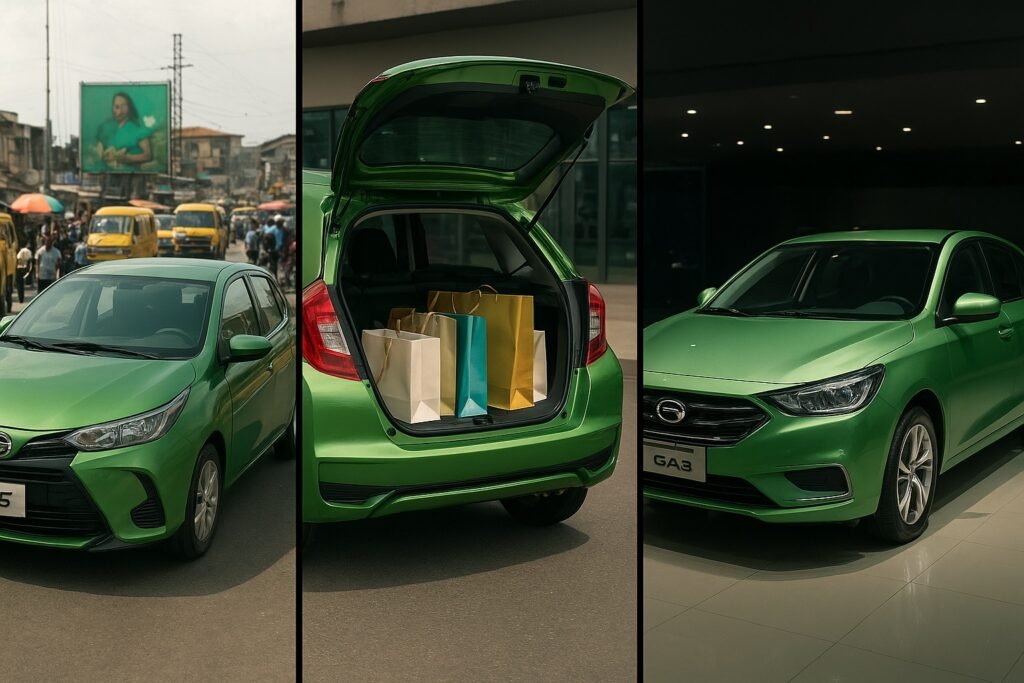
Best Mid-Range & Luxury Cars in 2025
Not everyone is hunting for the cheapest car in Nigeria. Some buyers want that balance between affordability, status, and comfort. That is where mid-range and luxury cars come in.
If you have ever sat in Lagos traffic inside a Toyota Camry with leather seats, smooth AC, and a quiet cabin, you will understand why people happily spend a little extra for comfort and class.
Popular sedans (Camry, Accord, Sonata)
For top sedans in the mid-range category, three stand out in 2025:
- Toyota Camry (tokunbo 2013–2017 or brand new 2021+ facelift): Reliable, comfortable, and excellent resale value. Nigerians even call it “muscle” or “spider” depending on the body style.
- Honda Accord: Stylish and spacious, but note: the newer models can be slightly more expensive to maintain than Camry, though they still command good resale.
- Hyundai Sonata – the “value-for-money” sedan. You will get a newer year Sonata for the same price as an older Camry. A family friend bought a 2017 Sonata for about ₦9m last year, and it looked fresher than most Camrys in the same price bracket.
Luxury picks (Mercedes, BMW, Lexus)
Now let’s step into the luxury lane. If you want that executive feel, here are the names that matter:
- Mercedes-Benz C-Class: Sleek design, premium feel, but higher maintenance costs (prepare for parts to bite harder than Toyota).
- BMW 3 Series: Sporty, fun to drive, perfect for those who want a little more “personality” in their ride. Downside: maintenance and mechanics who really know BMW are fewer outside big cities.
- Lexus ES – the “wise man’s luxury.” Same Toyota backbone, luxury comfort, and you don’t spend your weekends begging mechanics. I personally think it’s the best balance of status + durability in Nigeria.
What to consider: resale, comfort, durability
When considering mid-range and luxury cars in 2025, think about three big factors:
- Resale value: Toyota and Lexus win here. A Camry you buy for ₦12m today will still fetch decent money in three years.
- Comfort: Germans (Benz, BMW) edge out in driving experience, but Lexus and Camry are no slouches.
- Durability: Nigerian roads and mechanics “prefer” Toyota/Lexus. If you don’t want surprises, they are safer bets.
My personal take? If you are a young executive, start with a Camry or Accord, they will give you class without breaking the bank. But if you want to make a statement in Banana Island parking lots, a Lexus ES or Benz C-Class will get you nods of approval.
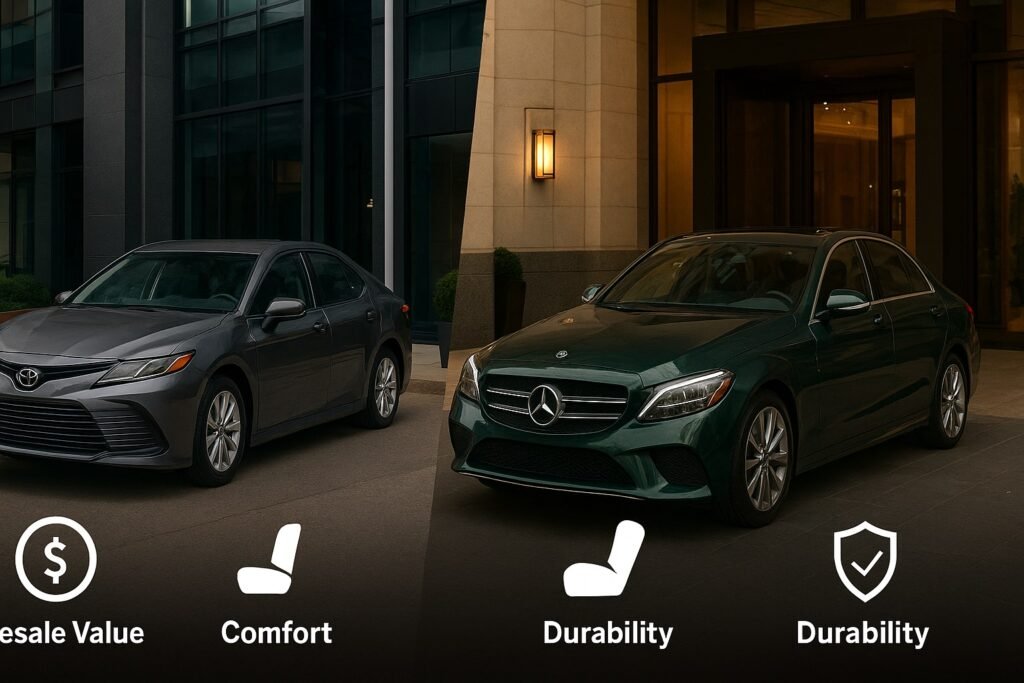
Other Popular (But Less Mainstream) Cars in Nigeria 2025
Now, let’s be real, not every car you see on Lagos roads is a Toyota Corolla, a Honda Accord, or a GAC GS4. Some models don’t get as much hype, but they have carved out their own little fan base. I like to call them the special mentions because they might not dominate the market, but if you know, you know.
Toyota Venza – stylish mid-size crossover
Take the Toyota Venza, for example. It’s like that cool cousin who is not always around but steals the show when he shows up.
The Venza is a mid-size crossover that blends the comfort of a sedan with the stance of an SUV. Stylish, fuel-efficient, and still rocking decent resale value though you will spend a bit more upfront compared to your typical RAV4.
I once rode in a friend’s Venza during a Lagos–Ibadan trip, and I remember thinking: “This feels like an SUV wearing a suit.” Smooth, but not exactly a Highlander when the potholes hit.
Toyota Sienna – family & transport favorite
Then there’s the Toyota Sienna, the undisputed king of family vans and school runs. If you have got four kids or you are doing “school shuttle” runs in Lagos, chances are you have either driven or sat in one. The space is a lifesaver.
I made the mistake of renting a smaller sedan for a family wedding trip once, and the luggage war in the trunk almost caused a civil war. A Sienna would have solved that in one swoop. No wonder they hold their value like gold.
Acura (MDX, RDX) – luxury SUVs, rare but premium
Acura SUVs (MDX, RDX) are another interesting set. They are not common, but when you see one, you know the owner has taste. Think of them as Honda’s luxury cousin; smooth ride, packed with features, but tricky when it comes to sourcing parts locally.
I had a colleague who brought in an Acura MDX from the U.S. a few years back. It looked stunning, but after the second trip to Apapa to “hunt” for parts, he started whispering prayers every time the check engine light came on.
Suzuki (Alto, Swift) – budget-friendly city cars
On the budget side, Suzuki sneaks in with models like the Alto and Swift. Small, affordable, and easy to maneuver — these are perfect for city driving, especially if you don’t want to break the bank. The only hiccup? Parts aren’t as common as Toyota or Honda, so you’ll need to know your mechanic well.
Mitsubishi (Outlander, Pajero) – rugged machine
Mitsubishi used to be a household name back in the Pajero days, and some Outlanders are still around. Tough machines, but they’ve lost ground in Nigeria because parts aren’t as widespread. The Pajero can still bully its way through rough roads, though, so don’t write it off completely.
Volvo – safety-first and reliable vehicle
For the premium crowd, Volvo deserves a nod. Safe, reliable, and with a loyal niche following. Problem is, Nigerians don’t love them like they love Toyota or Mercedes, so resale value is meh. I almost bought one once (XC90), but when the dealer mentioned parts might take “2–3 weeks to order,” I quietly walked away.
Ford (Explorer, Edge) – durable with solid performance
And let’s not forget Ford, models like the Explorer and Edge are spotted here and there. Solid performance, good comfort, but you’ll pay more in servicing costs. American cars have a way of making you smile until the maintenance bill lands.
Toyota Avensis
A mid-size sedan often seen with ride-hailing drivers (Uber, Bolt). Known for smooth drive and moderate fuel efficiency, but spare parts can be less available compared to Corolla/Camry.
Peugeot (301, 406, 508)
Once Nigeria’s pride through Peugeot Kaduna assembly, Peugeot still survives with fleet cars, government vehicles, and taxis. Strength = durability; downside = resale value and limited parts for newer models.
Nissan (Altima, Pathfinder)
Not as common today, but still visible in used imports. Nissan cars offer reliability, though parts can be pricier than Toyota’s.
Mazda (CX-5, Mazda 3)
Mazda is niche in Nigeria but admired for design and performance. Downsides = low spare part availability, lower resale compared to Toyota/Honda.
Chevrolet (Trailblazer, Aveo, Cruze)
Rare but spotted, especially in used-car markets. Attractive designs but resale + parts availability = main headache.
Hyundai (Elantra, Tucson, Santa Fe)
More common thanks to Stallion Motors Nigeria assembling Hyundai locally. Affordable and modern, but resale lags Toyota/Kia.
So yeah, while these brands may not headline every “Best Cars in Nigeria” list, they are still worth mentioning. Depending on your taste, budget, and tolerance for spare parts drama, one of these under-the-radar picks could be your perfect fit.
| Brand / Model | Strengths (Why Nigerians Love It) | Downsides (Things to Watch Out For) |
| Toyota Venza | Stylish & spacious crossover, reliable engine, comfortable ride, decent resale value | Pricier than RAV4, not as rugged on bad roads, higher fuel consumption, pricey parts |
| Toyota Sienna | Excellent for families, massive space, rugged for Nigerian roads, strong resale demand | High fuel consumption, premium maintenance cost |
| Acura (MDX, RDX) | Luxury features, Honda reliability DNA, stylish SUVs, good tech | Spare parts hard to find, expensive repairs |
| Suzuki (Alto, Swift) | Affordable, compact, easy for city driving, fuel-efficient, budget-friendly | Limited dealership support, smaller size, weak resale value |
| Mitsubishi (Pajero, Outlander) | Strong engines, rugged and durable SUV, handles tough terrains | Fading brand presence, parts availability issue, low resale value |
| Volvo (XC90, S60) | Very safe, durable, reliable, comfortable ride, strong engines | Low resale value, parts may take long to source, expensive to fix, limited service centers |
| Ford (Explorer, Edge) | Good performance, comfort, modern features, powerful engines, rugged | High servicing cost, not fuel-efficient, parts scarce, lower resale |
| Toyota Avensis | Popular with Uber/Bolt drivers, smooth drive, moderate fuel use | Parts less available than Corolla/Camry |
| Peugeot (301, 406, 508) | Nigerian legacy brand, durable, good for fleets | Weak resale value, newer models’ parts scarce |
| Nissan (Altima, Pathfinder) | Reliable, good performance, visible in used imports | Pricier parts vs. Toyota, fewer dealers |
| Mazda (CX-5, Mazda 3) | Stylish, good handling, admired by enthusiasts | Low parts availability, resale weak |
| Chevrolet (Trailblazer, Cruze) | Attractive design, powerful SUVs | Rare on roads, poor resale, scarce parts |
| Hyundai (Elantra, Tucson) | Locally assembled, modern design, affordable | Resale value weaker than Toyota/Kia |
SUVs vs Sedans vs Hatchbacks vs Crossovers vs Pickups – Which Should You Choose?
I will be honest, choosing the right type of car in Nigeria can feel like picking your favorite meal at a crowded buka. Back when I was shopping for my first serious ride, I kept bouncing between options.
One day it was a shiny Toyota Corolla sedan, the next it was a used RAV4 SUV, and then a hatchback caught my eye. It’s cheaper, smaller, and honestly cute. I even had a friend whispering, “Guy, just buy a pickup, you’ll never regret it.” Confusing doesn’t even begin to describe that phase.
Here is what I eventually learned: there is no “one-size-fits-all” car. SUVs, sedans, hatchbacks, crossovers, and pickups all have their sweet spots.
Once you match your lifestyle with what the vehicle offers in terms of budget, comfort, road conditions, or long-term value, then, the decision becomes way easier.
SUVs: For Families, Rough Roads, and Long Trips
SUVs are like the big uncles of Nigerian road. They are strong, dependable, and ready for anything. If you have ever tried driving through the pothole-filled stretch between Benin and Ore, you will know why Nigerians love SUVs. They sit higher, so you are less worried about scraping the bottom on rough patches.
Popular choices include the Toyota Highlander, Honda CR-V, and newer GAC GS4. Downsides? They eat up more fuel, and they are pricier to maintain. However, if you have family, luggage, or business trips across states, that comfort and space pay off.
One friend swears by his Hilux (technically a pickup, but SUV-like in its toughness). His exact words: “Fuel dey pain me, but the peace of mind no get price.”
Sedans: Comfort, Affordability, and Fuel Economy
Sedans are still the kings of affordability in Nigeria. The Toyota Corolla, Camry, and Honda Accord remain some of the most reliable cars you can buy. What I like about sedans is how they balance comfort with fuel economy. You will feel the savings every time you stop at the filling station.
If you are a city driver commuting to work in Lagos traffic or running errands in Abuja, sedans are just right. The suspension is softer than a hatchback, so you won’t feel every stone on the road.
The main downside is clearance. If you are constantly traveling on rural or unpaved roads, you will curse that low bumper a few times.
Hatchbacks: Best for City Driving and Budget Buyers
Now, hatchbacks are the underrated heroes, especially for first-time buyers. Think Hyundai i10, Kia Picanto, or Toyota Yaris. They are compact, meaning you can squeeze into tight parking spaces in crowded cities like Lagos or Port Harcourt.
They sip fuel like a careful drinker at a wedding, and parts are often cheaper. But—and this is a big but—don’t expect to carry a full family plus luggage on a hatchback. They shine for single professionals, students, or people just needing a reliable A-to-B ride.
Crossovers: The Sweet Middle Ground
Crossovers sit between SUVs and sedans, giving you a taste of both. They look rugged but handle more like a car, making them great for folks who want SUV clearance without guzzling fuel like one.
Examples? Toyota Venza, Nissan Qashqai, and Honda HR-V. Personally, I think crossovers are one of the best choices for Nigerian roads right now. They are versatile and practical without being overkill.
Pickups: Rugged Utility Above All
Pickups are the workhorses. Toyota Hilux, Ford Ranger, and Isuzu D-Max dominate here. They shine if you are into farming, construction, or just want a vehicle that can survive punishment from poor roads.
They are not the most fuel-friendly, but they will outlast many sedans in tough conditions. A friend once told me, “The Hilux no dey die.” And honestly, he’s not wrong.
Quick Decision-Making Framework
So, how do you decide without losing your mind? Here is my cheat sheet:
- If you travel long distances often, deal with rough roads, or have a big family; use SUV.
- If you want comfort, balance, and fuel savings, and you are mostly in the city; consider using Sedan.
- If you are on a tight budget, live in busy areas, and don’t carry much load; Hatchback might be the way to go.
- Consider a Crossover if you want the SUV feel but at lower running costs.
- Go for a Pickup if rugged utility and long-term durability matter more than fuel economy.
And if none of these categories feel like a fit, don’t worry, we cover other “Special Mentions” like Toyota Sienna, Acura, Volvo, and even Suzuki in the [Other Popular (But Less Mainstream) Cars in Nigeria 2025] section above.
I’ve made the mistake before of choosing “what looks cool” over “what I really need.” Don’t do that. Sit down, write your budget, think about your daily routine, and be honest about road conditions. That’s how you will land the best fit without regrets.
Pro tip: The cheapest car on paper isn’t always the most affordable in real life. Repairs, fuel economy, and resale value can make or break the deal. This is exactly why so many first-time buyers book a session with us at Godlovesme Trending Cars (GTC), we calculate the true total cost of ownership before they commit, so they save money long after the purchase.
| Car Type | Strengths | Downsides | Best For | Popular Models in Nigeria |
| SUVs | High ground clearance, spacious, family-friendly, safe on rough roads | Higher fuel consumption, costlier maintenance | Families, long-distance travel, rough terrains | Toyota Highlander, Honda CR-V, GAC GS4 |
| Sedans | Affordable, fuel-efficient, comfortable for city driving | Low clearance, struggles on rural roads | City commuters, budget-conscious buyers | Toyota Corolla, Toyota Camry, Honda Accord |
| Hatchbacks | Compact, easy to park, very fuel-efficient, cheap parts | Limited space, not great for rough roads or large families | Students, single professionals, first-time buyers | Hyundai i10, Kia Picanto, Toyota Yaris |
| Crossovers | Balance of SUV clearance + sedan comfort, stylish, moderate fuel use | Not as rugged as full SUVs, still pricier than sedans | Urban drivers who want versatility | Toyota Venza, Honda HR-V, Nissan Qashqai |
| Pickups | Rugged, durable, great for off-road, strong resale value | Poor fuel economy, less comfort for daily city use | Farmers, contractors, utility-heavy drivers | Toyota Hilux, Ford Ranger, Isuzu D-Max |
Car Financing Options in Nigeria 2025
When I bought my first car in Lagos, I thought I had it all figured out. I saved for months, walked into the dealership, and still ended up short by a few million naira.
The salesman smiled and said, “Don’t worry, we have financing options.” I nodded like I understood, but honestly, I was lost. That day I learned the hard way that in Nigeria, how you buy your car can be just as important as the car itself.
Auto loans (banks, microfinance, fintechs)
Now, in 2025, things are a bit better. Auto loans are no longer this mysterious thing reserved for “big men.” Most of the major banks now offer car loans, GTBank, Access, Zenith, you name it.
The tricky part is the interest rates. On average, you are looking at 20–25% annually depending on your credit score and income level.
Fintechs and microfinance banks have stepped in too, sometimes approving loans faster, but the catch is even higher interest. My cousin used a fintech loan to grab a Toyota Corolla, and while the approval took just two days, he complained later about the monthly repayment swallowing his salary.
You can use our Auto Loan Calculator | estimate your monthly car payments in Nigeria. This will help you make smart decision.
| Financing Option | Who It’s Best For | Interest Rate Range | Pros | Cons |
| Bank Auto Loans | Salaried workers with stable income | 20–25% | Structured, safer, long tenure | Slow approval, paperwork heavy |
| Fintech/Microfinance Loans | Young professionals, small biz owners | 25–35% | Fast approval, minimal collateral | Higher rates, strict penalties |
| Leasing | First-time buyers, people who change cars often | 18–25% | Lower monthly payments, flexible | No ownership until fully paid |
| Fleet Financing | Businesses (logistics, staff cars, rentals) | 15–22% (negotiable) | Easy scaling, vehicles generate income | Requires business registration & records |
Leasing vs. outright buying
Leasing is another route that people don’t always talk about enough. With leasing, you don’t technically own the car until you have completed payments. It feels lighter on the pocket month-to-month compared to an outright loan, but you have to be disciplined.
I once helped a client lease a Hyundai Elantra through a company scheme, and he said it felt like “renting-to-own.” If you are someone who changes cars often, leasing might actually save you stress compared to sinking all your savings into one vehicle.
Fleet & business car financing
For businesses, fleet financing is where the real magic happens. One logistics company I consulted for got 10 pickup trucks through a fleet loan, spreading repayment across 3 years.
It allowed them to scale faster instead of draining their working capital. The banks usually prefer this because the cars themselves serve as collateral, and it’s easier to justify since the vehicles generate income.
Tips for first-time buyers
Now, let me drop some tips for first-time buyers so you don’t repeat my mistakes:
- First, don’t just look at the monthly repayment rather, calculate the total cost across the loan term. A ₦5m car could cost you ₦8m by the time you finish paying, once interest and fees are factored in.
- Second, always compare at least three lenders. The difference between a 20% and 25% loan rate may not sound like much, but over three years, it’s huge.
- And finally, if your income is unstable, like freelancing or running a small hustle, be careful with loans. Sometimes it’s better to delay and buy tokunbo outright than get trapped in endless repayments.
Buying a car in Nigeria is stressful enough with traffic, fuel, and maintenance. The financing side doesn’t have to ruin you too. Do your homework, negotiate where possible, and remember, it’s not just about driving off the lot, it’s about keeping peace of mind while you pay it off.
Car Ownership Costs in Nigeria 2025
When I bought my first car, a Volvo V60, I thought the big headache was just the purchase price. Oh boy, I was wrong. The real shock came after—the constant fuel runs, mechanic wahala, and insurance payments I didn’t even budget for. Owning a car in Nigeria is like having a second child. If you don’t plan well, it will humble you.
Fuel Expenses
Petrol is the biggest daily expense for most car owners here. With fuel prices swinging like a yo-yo since subsidy removal, you can easily spend ₦70k–₦100k monthly if you drive daily within Lagos. SUVs and V6 engines? Double that.
If you are on a budget, stick with compact sedans or hatchbacks—they sip fuel instead of guzzling it.
Maintenance & Repairs
Here is where Nigerians often underestimate costs. Routine servicing (oil, filters, brake pads) for a Toyota might be ₦30k–₦40k quarterly. For Honda, closer to ₦50k. But once you cross into luxury brands, a single visit to the workshop can wipe out your savings—imagine ₦250k for a Mercedes-Benz service.
And don’t forget Nigerian roads destroy suspensions; budgeting ₦100k–₦150k yearly for suspension work is realistic.
Insurance & Documentation
A lot of first-time buyers forget insurance. Third-party insurance is around ₦15k yearly, but comprehensive (the one that actually protects you) can run into hundreds of thousands depending on the car.
On top of that, you need to add roadworthiness, driver’s license, and yearly vehicle license renewal fees. When you add all these together, you are realistically dropping at least ₦50k–₦100k just to stay on the road-legal.
Hidden Costs Nobody Tells You
I will never forget when LASTMA towed my car because I parked 5 minutes in the wrong spot. Between towing fees, fines, and “settlement,” I dropped almost ₦80k in a single day.
That’s not even counting things like new tires (₦80k–₦150k each depending on size) or the small “weekend expenses” when mechanics keep asking for transport money.
Tips for Managing Ownership Costs
- Buy a car you can maintain, not just one you can afford upfront.
- Always set aside a small “car emergency fund”, at least ₦20k monthly.
- Do preventive maintenance; ignoring small faults becomes expensive later.
- If your job requires heavy daily movement, seriously consider fuel-efficient models like Toyota Corolla, Honda Civic, or GAC GA4.
Owning a car in Nigeria isn’t cheap, but if you plan ahead, it won’t wreck your finances. I learned that budgeting for fuel + maintenance + documentation from day one saves you plenty of sleepless nights.
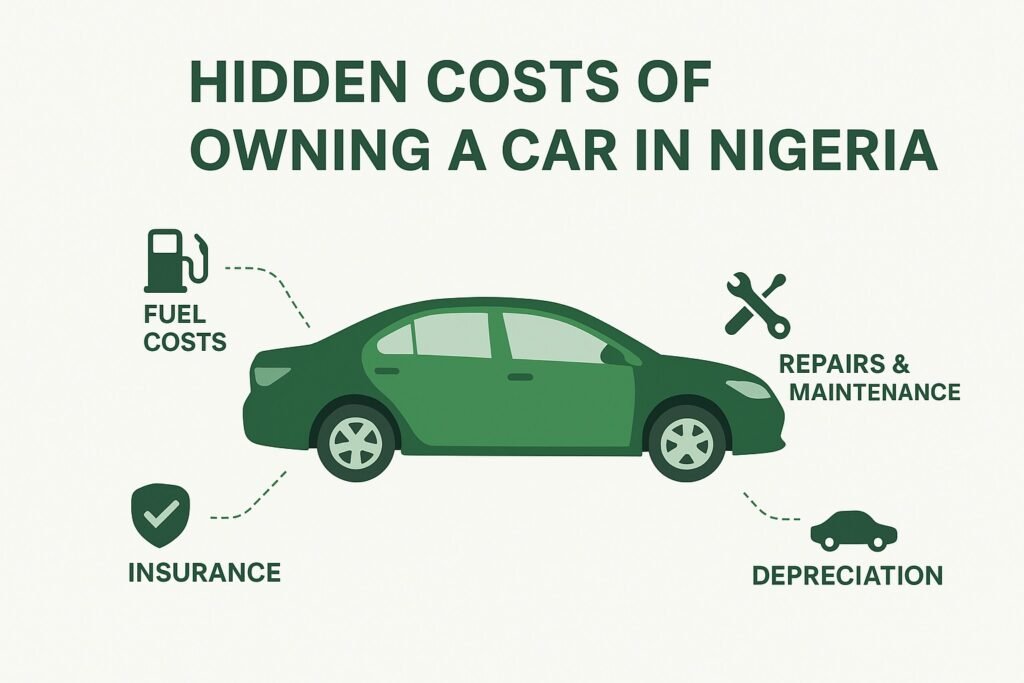
Car Resale Value & Depreciation in Nigeria 2025
One thing I always tell anyone buying a car in Nigeria is this: don’t just think about today’s price tag. The real cost of a car shows up when you try to resell it.
I learned this the hard way years back with a Kia Cerato—it looked sharp, price was fair, but when I tried to sell after three years, buyers were pricing it like pure water.
Meanwhile, a friend of mine with a Toyota Corolla almost made back half of his purchase price without stress. Lesson learned.
Which Cars Hold Value in Nigeria?
Toyota is still king when it comes to resale. Corolla, Camry, and Highlander especially, they are basically “liquid cash on wheels.” Honda Civic and Accord also do well, though their higher parts cost sometimes makes buyers hesitate.
Chinese brands like GAC or Chery, and locally assembled cars from Innoson or Stallion, are improving but still depreciate faster. A ₦20m brand-new GAC GS4 today might only fetch ₦10–11m after three years. Hyundai and Kia fall into the same category.
On the other hand, Toyota and Honda hold their ground far better—buyers line up for them.
Here is a 5-year depreciation curve based on typical Nigerian market realities:
| Brand / Model Example | Year 0 (New / Tokunbo 2025) | Year 1 (2026) | Year 2 (2027) | Year 3 (2028) | Year 5 (2030) | Notes |
| Toyota Corolla / Camry / Highlander | 100% | 88–90% | 78–80% | 70–72% | 60–65% | Safest bet, “cash on wheels” |
| Honda Accord / Civic | 100% | 85–87% | 75–77% | 65–68% | 55–60% | Good value, parts cost slightly higher |
| GAC GS4 / GS8 | 100% | 80–82% | 65–70% | 55–60% | 40–45% | Popular, but depreciation faster than Toyota |
| Hyundai Elantra / Sonata | 100% | 78–80% | 65% | 55% | 40% | Buyers still skeptical, resale weak |
| Luxury (e.g., Mercedes C-Class) | 100% | 75–78% | 60–65% | 50–55% | 35–40% | Heavy depreciation, esp. locally used |
Tokunbo vs. Nigerian-Used
Foreign-used (tokunbo) cars almost always have stronger resale value than Nigerian-used. Why? Condition, mileage, and trust. Nigerian roads punish cars badly, and local buyers know this.
If you are planning to resell within 2–3 years, tokunbo is a safer play than brand-new or Nigerian-used—unless you are keeping the car long-term.
Luxury Cars Depreciation
Luxury is where people cry the most. A 2025 Mercedes C-Class at ₦60m new? Three years later, you might be begging to sell it at ₦30–35m.
Nigerian luxury buyers mostly prefer tokunbo imports, not locally used luxury cars. If you want to enjoy luxury and not lose your shirt, go tokunbo, not brand-new. And if you can afford brand new, please go for it. This gives you class, prestige and louder voice.
Hybrids & EVs
Hybrids are slowly finding better resale footing, especially Toyota Prius or Camry Hybrid, because people trust Toyota engineering. But full electric vehicles? Resale is still weak. Buyers fear battery replacement costs and Nigeria’s charging network isn’t ready. For now, EVs are better as passion projects, not resale-friendly investments.
Quick Tips for Buyers
- Toyota = safest bet for resale.
- Keep service records. A stamped logbook can boost your resale by 5–10%.
- Financing + poor resale = double wahala. Don’t finance a car that loses half its value in 2 years.
- Avoid unpopular brands (Peugeot, Mitsubishi, even some Volvos). Great cars, but resale is tough.
- Color matters. Black, silver, and white move fast. Gold, purple, or green? Prepare for stress. I once tried selling a gold-colored SUV and dealers flat-out told me: “Oga, this color no dey move market.” I had to slash the price just to offload it. Never again.
Chinese & Locally Manufactured Cars in Nigeria 2025
If you told me 10 years ago that Nigerians would seriously consider buying Chinese cars or proudly drive locally manufactured vehicles, I would have laughed and said “na joke?” But here we are in 2025, and the car market has flipped in ways I couldn’t have imagined.
Between the rise of Chinese automakers like GAC, Changan, and Geely, and local assembly plants run by Stallion Group, Innoson, and Peugeot Nigeria, buyers suddenly have more options than the old Toyota vs. Honda debate.
Why Nigerians Are Paying Attention
The truth is, the dollar-to-naira rate has priced many people out of Japanese, German, and American cars. That gap left room for cheaper alternatives and Chinese automakers jumped in first.
A brand-new GAC GS3 sells for about ₦15–18 million, while a Toyota RAV4 is almost ₦30 million. Throw in modern features like reverse cameras, leather interiors, and infotainment screens, and suddenly Chinese brands look very tempting.
Local manufacturers are also pushing aggressively. Innoson’s vehicles are still seen more in the government and corporate fleet space, but they are cheaper to buy and easier to maintain with local parts. Stallion Group assembles Hyundai and Honda, while Peugeot Nigeria is trying to win back loyalists with updated models.
Pros and Cons (from Real-World Use)
I once borrowed a friend’s Changan CS35 for a road trip to Ibadan. The AC was ice-cold, fuel economy was great, and the cabin was surprisingly comfy. But the suspension took a serious beating on bad patches, and I kept wondering if it would age well compared to a Toyota Corolla. That’s the typical Nigerian buyer’s dilemma: short-term comfort vs. long-term durability.
Chinese Cars – Quick Take
- Affordable, stylish, loaded with tech features.
- Financing options (GAC, especially, partners with banks).
- Poor resale value compared to Toyota/Honda.
- Spare parts still hard to find outside Lagos/Abuja.
Locally Manufactured Cars – Quick Take
- Lower price points than imports.
- Easier access to spare parts (Innoson especially).
- Financing options (Innoson also partners with Access bank).
- Supports local jobs and economy.
- Moderate model variety.
- Prestige factor—many Nigerians still prefer imported brands.
Where They Shine in 2025
- Chinese Cars: Crossovers and SUVs (GAC GS3, Changan CS55), sedans for ride-hailing fleets, and corporate leases.
- Local Cars: Government fleets, SMEs looking for budget utility vehicles, patriotic buyers who want “Made in Nigeria.” / Nigeria first.
Final Word
Chinese cars and locally manufactured vehicles are no longer side jokes in Nigeria’s auto market, instead, they are serious contenders.
If you are budget-conscious, need modern features, or want financing options, Chinese brands may be your best bet. If you value easy access to spare parts and want to support Nigerian industry, then local manufacturers are worth a look. Just keep in mind resale value and long-term durability when making your decision.
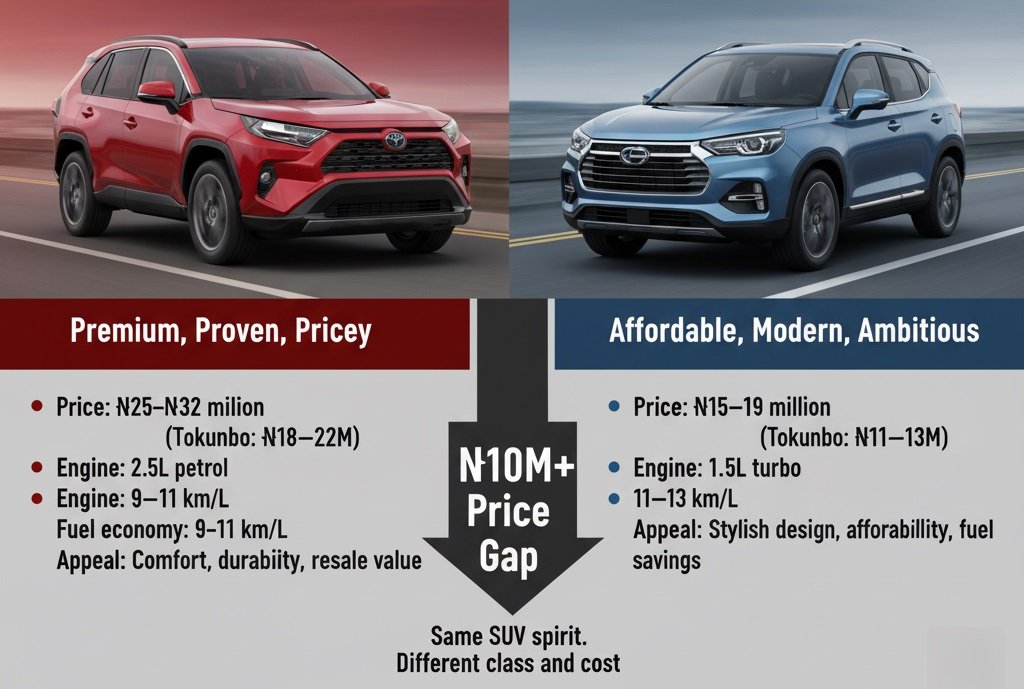
Hybrid & Electric Cars in Nigeria 2025
Whenever I hear people talking about Tesla or Toyota hybrids, I chuckle because the Nigerian reality is different from what you see abroad.
Here, the conversation around hybrids and EVs is usually split between dreamers and pragmatists.
Some folks swear that “electric cars can never work here” because of power supply wahala, while others are already quietly importing hybrids for Uber fleets and private use. Truth is, 2025 has brought a small but noticeable shift.
Hybrids Gaining More Ground
If you are shopping for efficiency but still want something practical for Nigerian roads, hybrids are the sweet spot right now.
The Toyota Camry Hybrid, Honda Accord Hybrid, and even Lexus RX Hybrid are showing up more in Lagos and Abuja. Why? Because they don’t depend on PHCN or charging stations, just fuel plus regenerative braking.
I tested a Toyota Prius once in Abuja. The fuel consumption blew my mind—barely touched a quarter tank after a full day of errands. But I also realized mechanics weren’t fully confident working on it. That’s the hidden challenge: low-cost hybrids save fuel, but you will need trusted workshops that understand the tech.
Electric Vehicles (EVs) – Still Early Days
Let’s be real: EVs are still a luxury in Nigeria. A brand-new Tesla Model 3 costs upwards of ₦45–50 million, and even if you import a used one, the question is: where will you charge it? Yes, Abuja and Lagos have a few private EV charging stations, and some fintechs are testing pay-per-charge services, but it’s far from mainstream.
That said, don’t write EVs off completely. Chinese brands like BYD and Changan are aggressively pushing affordable EVs into Africa. Innoson even hinted at assembling EV buses for fleets in the near future.
If government incentives or private investors scale charging infrastructure, adoption could suddenly skyrocket.
Pros and Cons Snapshot
Hybrids – 2025 Nigeria
- Saves up to 40% on fuel costs.
- No dependency on public electricity.
- Repairs/parts are expensive.
- Few mechanics trained for hybrid tech.
EVs – 2025 Nigeria
- No petrol costs at all (if you have home solar + inverter).
- Quiet, futuristic, zero emissions.
- Very high upfront price.
- Lack of charging infrastructure.
Who Should Consider Them?
- Hybrids: Middle to upper-class buyers tired of fuel queues, Uber/Bolt fleet owners, city drivers who rack up mileage daily.
- EVs: Early adopters, companies running pilot projects (banks, tech firms), and eco-conscious individuals with backup power at home.
Final Word
Hybrids are already a smart choice for 2025 if you want to cut fuel costs without worrying about charging stations. EVs, meanwhile, are more of a long-term investment unless you have the budget and infrastructure at home.
The trend is clear though: the Nigerian car market is slowly but surely shifting, and by the next 5–7 years, you may see EVs becoming as common as today’s hybrids.
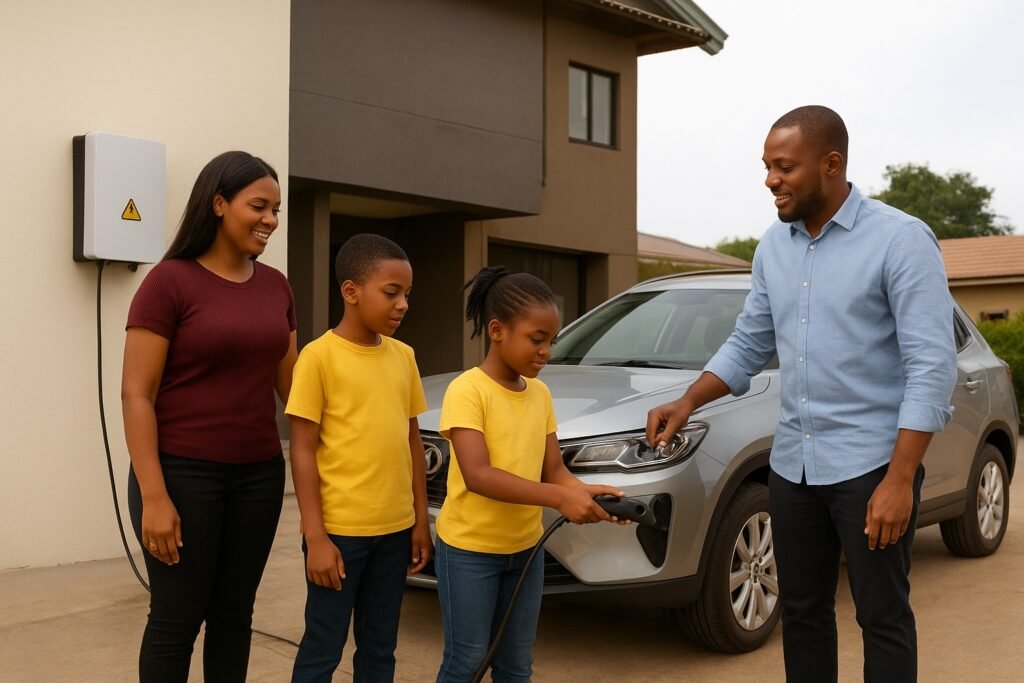
Tips for Buying a Car in Nigeria in 2025
Buying a car in Nigeria can feel like a mix of excitement and headache. I still remember when I was hunting for my first “tokunbo” (foreign used) ride, a Toyota Corolla. One dealer told me, “Oga, this motor na Belgium, clean!” only for me to later find out it had accident history and even mileage tampering. That mistake cost me weeks of stress and a bit of money, so trust me when I say—being careful pays.
New vs. Used Decision-Making
Here’s the truth: most Nigerians go for used cars (tokunbo or Nigerian-used) because they are cheaper upfront. A brand-new Corolla in 2025 can go for around ₦25m, while a solid tokunbo might be ₦10–12m. But new cars come with warranty, better fuel efficiency, and zero hidden wahala.
My advice? If you are buying for long-term use and can afford the upfront hit, go new. If your budget is tight but you want reliability, go for a well-inspected tokunbo from a trusted source.
Documents to Check Before Buying
This is where many people get burnt. Always ask for:
- Custom papers (duty paid receipt is a must)
- VIN check (use online tools to confirm accident or theft history)
- Proof of ownership (especially for Nigerian-used cars)
- Insurance papers if it’s a fairly recent car
One time I skipped checking the VIN properly, and the car turned out to be flagged abroad. Clearing that issue almost made me regret the whole deal. Don’t take shortcuts here, please.
Import Duties & Hidden Costs
One thing that shocks first-time buyers is how much import duty inflates prices. In Nigeria, tokunbo cars attract about 35% import duty plus an additional levy depending on engine size.
That means a $10,000 car abroad can land here at ₦19m–₦25m (at the rate of ₦1,500 to a dollar) after shipping and clearing. No wonder people complain that “cars are cheap in America but expensive here.”
On the flip side, locally assembled brands like Innoson, GAC (assembled in Lagos), and Peugeot Nigeria sometimes enjoy tariff incentives, making them slightly cheaper than full imports.
Also note that hybrids and electric cars may face different duty categories in 2025, so always confirm the current rates before paying a dealer.
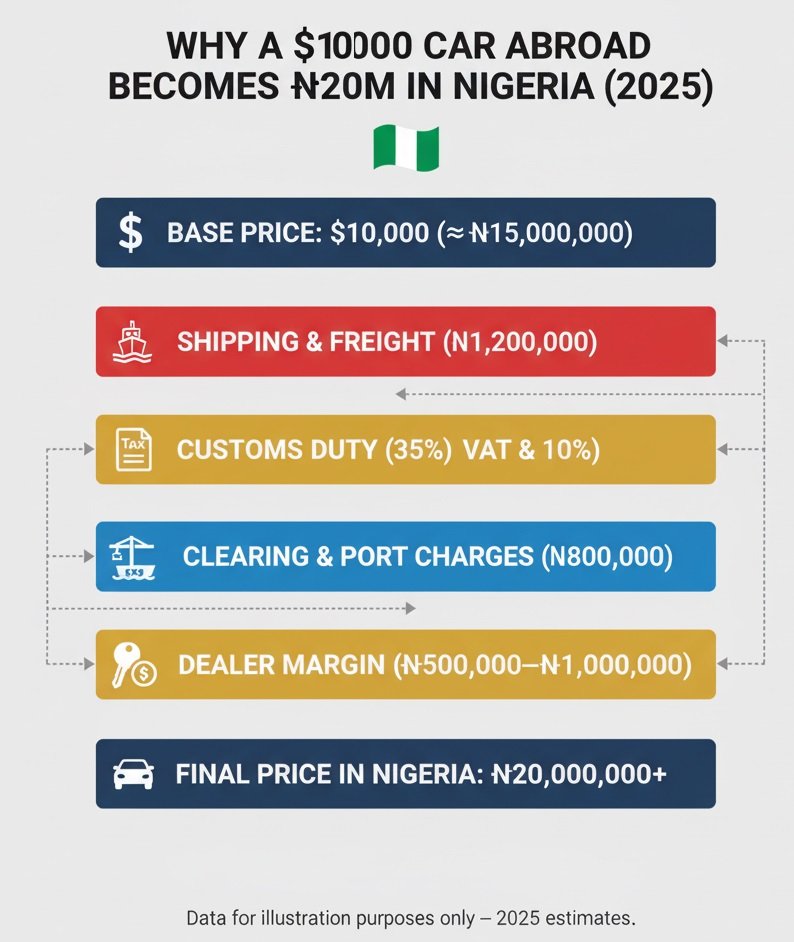
Avoiding Scams and Fake Dealers
Scammers are sharper now in 2025. Some set up flashy Instagram pages with pictures of cars they don’t own. A quick tip: never transfer full payment without seeing the car in person.
Dealerships that refuse inspection or pressure you with “another buyer is waiting” lines are waving red flags. And if the deal sounds too good, like a 2022 Lexus RX for ₦7m, just know someone is trying to play you.
Where to Buy: Trusted Dealerships & Online Platforms
If you are in Lagos, Abuja, or Port Harcourt, big dealerships like Elizade, Globe Motors, or Stallion Group are solid for new cars.
For tokunbo, places like Berger Yard (Lagos) and Karu Motor Market (Abuja) still hold their ground.
Online, platforms like Cars45, Autochek Africa, and Jiji can work, but only if you do physical inspections before paying.
Personally, I’ve had the smoothest experience using one of the platforms above for valuation before buying. It gave me peace of mind that I wasn’t overpaying.
Quick Tip
Take along a trusted mechanic for inspection. A small ₦20k to ₦50K check-up can save you millions down the line.
| Category | Brand New | Tokunbo (Foreign Used) | Nigerian Used |
|---|---|---|---|
| Average Price Range | ₦25M – ₦70M | ₦7M – ₦30M | ₦3M – ₦15M |
| Pros | – Zero mileage – Manufacturer warranty – Latest tech & safety features – No prior wear or damage | – Cheaper than brand new – Often well-maintained abroad – Wide variety of models available | – Most affordable option – Easy to inspect locally – Immediate availability |
| Cons | – Very expensive upfront – High depreciation in first 2 years – Higher insurance cost | – Possible odometer tampering – Shipping or clearing delays – May require minor fixes | – Uncertain maintenance history – Higher risk of hidden issues – Lower resale value |
| Common Risks | – Rapid depreciation – Market resale value may drop quickly | – Import scams or poorly refurbished cars – Unverified accident history | – Engine or transmission faults – Fake parts during past repairs |
| Best For | Buyers seeking long-term reliability and status | Budget-conscious buyers who want quality and modern features | First-time buyers or those needing a temporary or backup car |
Common Challenges & Mistakes to Avoid in Car Financing & Ownership
When I was younger and eager to get my first car loan, I rushed into signing papers at the bank without fully understanding the terms. Big mistake.
Six months later, I realized I was paying way more in interest than I had bargained for, and I couldn’t even keep up with the monthly repayments. That experience taught me some hard truths about car financing in Nigeria.
Taking Loans Without Reading the Fine Print
A lot of people just see “monthly repayment ₦200k” and think, oh I can manage that. But they forget to ask: what’s the interest rate? What’s the tenure? Are there hidden admin charges? Some banks in Nigeria sneak in insurance, processing, and “monitoring” fees that bump up the cost by hundreds of thousands over time.
In 2025, fintech car loans are everywhere.These are apps promising “instant car ownership” with flexible payments. They look attractive, but many hide FX-linked repayment clauses.
What that means is: if the dollar rises, your monthly repayment can also rise. With the naira-dollar rollercoaster, that’s a serious risk if you don’t read carefully.
Not Asking About Repossession Trackers
Some lenders now install hidden trackers in financed cars. Miss two or three repayments, and the car can be remotely disabled or repossessed. It sounds extreme, but it’s happening more as lenders protect themselves.
If youare financing, ask directly: “Does this agreement include repossession tracking?” Better to know upfront than be shocked when your car suddenly won’t start.
Overestimating Your Budget
One of my friends bought a used Toyota Camry through financing. He calculated his salary could cover the repayments, but he didn’t account for fuel, maintenance, and insurance. By month three, he was borrowing to stay afloat.
Always run the math like this: if your car repayment + running costs is more than 30% of your monthly income, you’re setting yourself up for stress.
Underestimating Ownership Costs
It’s not just about the loan. Cars in Nigeria eat money in different ways such as repairs, documentation, even traffic fines.
I know a guy who budgeted perfectly for his loan, but when his gearbox packed up, he had no backup fund. A ₦600k repair forced him to abandon the car.
That’s why I always tell people: set aside at least ₦20k monthly in a “car emergency pot.”
Falling for Fake Dealers & Scams
This one hurts to see. With so many online car platforms now, scammers are everywhere. I almost fell for one myself. It was a too-good-to-be-true deal on a Honda CR-V. Luckily, I insisted on physically inspecting and running a VIN check. If I hadn’t, I would have lost ₦3m.
Always deal with trusted dealerships or verified sellers, and never pay in full without paperwork.
Not Considering Future Resale Value
Another trap is going for flashy but unpopular brands. Sure, that Chinese SUV might look good today, but when it’s time to resell, nobody is buying.
Toyota and Honda hold value better here, while newer brands like GAC are catching up but still finding their resale footing.
If you plan to change cars in 3–5 years, resale value should guide your decision.
Tips to Avoid These Mistakes:
- Compare at least 3 financing options before choosing.
- Keep total car costs (loan + expenses) under 30% of income.
- Always leave room in your budget for emergency repairs.
- Verify sellers and avoid making full payments upfront.
- Think about resale value before committing.
- Confirm if your loan has dollar-linked repayments or repossession trackers.
Buying and owning a car in Nigeria can be exciting, but if you don’t plan smartly, it will frustrate you.
I’ve made my share of mistakes so you don’t have to. Learn from my scars—cars are not just purchases; they are financial commitments.
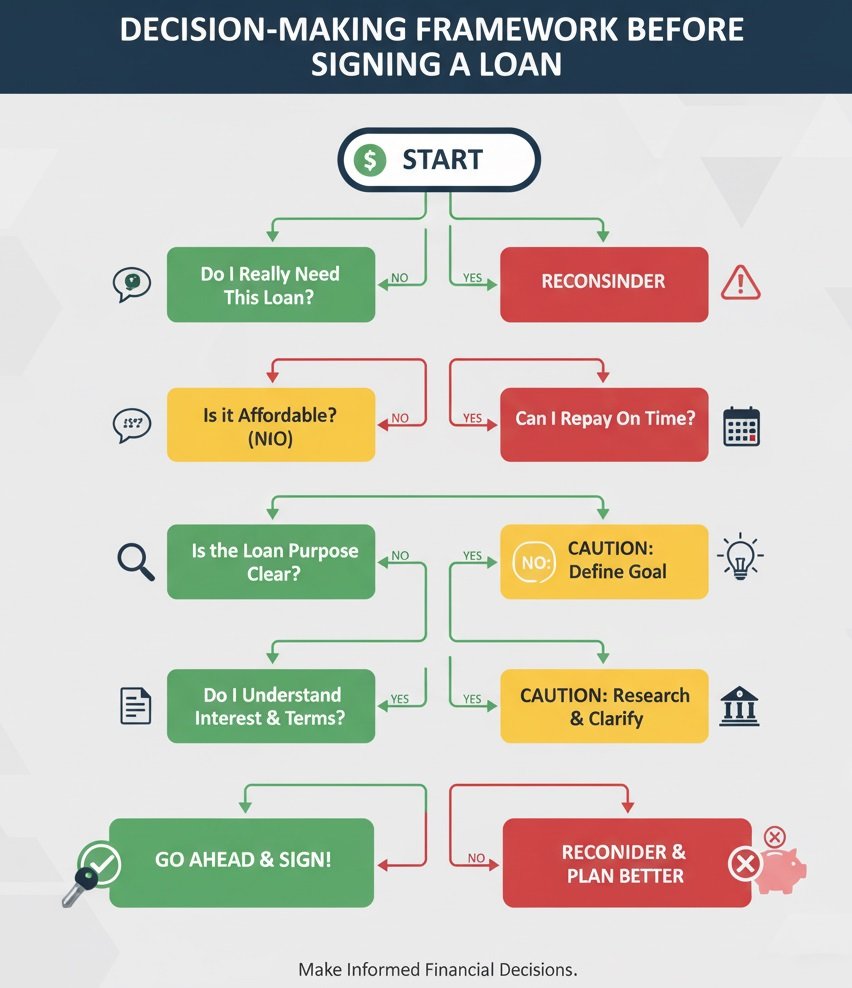
This decision-making framework walks you through the key questions every borrower in Nigeria should ask from “Do I really need this loan?” to “Can I repay it comfortably?” — helping you make a smart, stress-free financial choice.
Use my Auto loan calculator to compare and understand your monthly payment over the loan period of your choice.
Conclusion
The Nigerian auto market in 2025 is more dynamic than ever. From Toyota’s resale kings to the rising wave of Chinese and locally assembled models, plus hybrid and electric options slowly entering the roads, buyers have more choices, but, also more decisions to make.
SUVs remain the go-to for rough Nigerian roads, sedans strike the balance between comfort and cost, while hatchbacks and compact cars keep city driving affordable.
The truth is: the best car for you is not just about looks, it’s about matching your budget, lifestyle, road conditions, and long-term ownership goals.
Factor in hidden costs like fuel, insurance, and documentation, and don’t forget resale value and financing risks like FX swings.
Ready to go deeper? Explore my detailed guides on SUV Financing Options for First-Time Buyers in Nigeria (2025), eco-friendly car ownership, locally manufactured cars vs imports, and the Toyota vs. Honda vs. GAC: Best Value Car Brand in Nigeria (2025).

